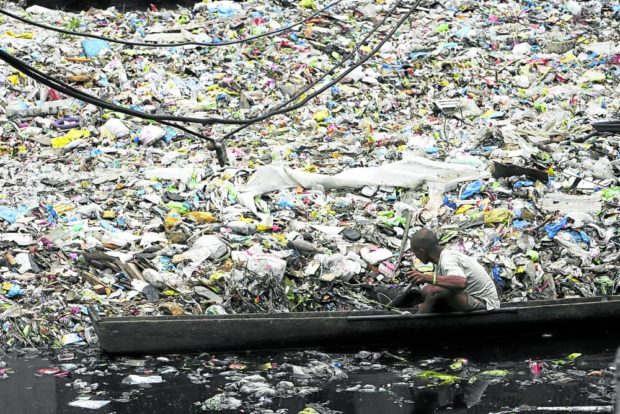
A FUTURE WITHOUT PLASTIC? The Philippines produces 2.15 million tons of plastic waste every year, mostly single-use items like sachets. Over a third of the plastics leaks into the open environment like this trash hill in San Juan City. —INQUIRER PHOTO
MANILA, Philippines — Climate-minded groups are on a mission to get rid of those small ubiquitous plastic packets used as packaging for shampoo, toothpaste, and dishwasher soap, among many other products, for a “sachet-free future” for every Filipino.
Realizing the huge impact of plastic pollution, individuals from more than 20 private institutions, innovation hubs, sustainability firms, nonprofit organizations, and the government have signed a public manifesto calling for an end to sachet packaging and encouraging refilling stations for products instead.
In the manifesto, the signatories asked the Food and Drug Administration to legalize mainstream refilling of products, especially cosmetics like liquid soap and shampoo.
Reducing footprint
They said promoting refilling systems for those products as a starting point “can spark significant change in how Filipino consumers patronize household products” in sustainable packaging and “enable them a reasonable way to further reduce their plastic footprint.”
The signatories said this move could also be an opportunity for the Philippine government to further fulfill its commitments in the Paris Agreement concerning climate mitigation and adaptation and for businesses to be able to support this path to sustainability.
Among the signatories were environment advocate Anna Oposa of Save the Philippine Seas, French ambassador Michèle Boccoz, Commissioner Rachel Herrera of the Climate Change Commission, Juan Carlos Hechanova of MakeSense Asia and Teddy Baguilat Jr., former Ifugao representative and governor.
The signatories also called for the mainstream adoption of refill-and-reuse systems in sari-sari stores, where 67 percent of Filipinos buy their daily household needs.
“As consumers, we seriously recognize the extensive effect of sachet pollution not just on the environment but also on the overall quality of human life including but not limited to the industries we work in, our communities, our sources of income, our physical health, and the well-being of our families and loved ones,” the manifesto said.
52% single-use plastics
Citing a recent study by Global Alliance for Incinerator Alternatives, the signatories noted that 52 percent of the country’s total plastic waste is composed of single-use plastics, mainly sachets.
They said around 20 percent of plastic waste ends up in oceans, risking the safety of coastal communities and some major industries, including shipping and fishing.
Earlier, No Other Year For Plastics (Noypi) coalition convened by MakeSense Asia and its partner organizations put up an online petition calling on corporations and manufacturers to provide “a more sustainable and Earth-friendly alternatives to sachets.”
They asked consumers to reduce the purchase of sachet packaging in supermarkets and sari-sari stores.
The petition by Noypi has so far collected more than 10,000 signatures.